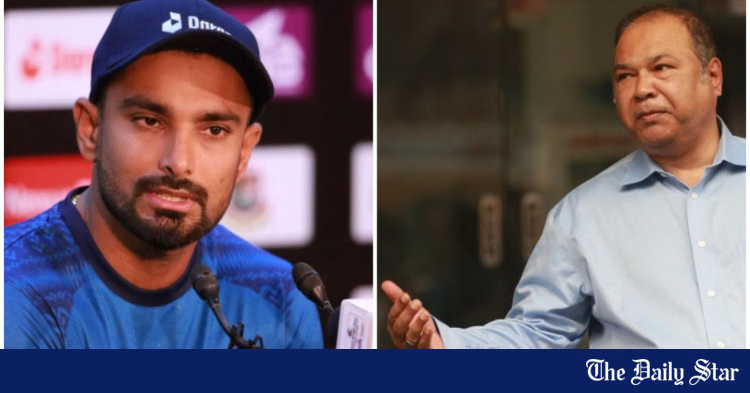Selection rift: Is Litton’s anger baseless?

A day before the start of an international series, Bangladesh T20I captain Litton Das drags the selectors into the dock and expresses deep dissatisfaction with the cricket operations department’s policies. Even though such drama becomes material for the media ahead of a low-profile series, for any team or cricket board, it’s an uncomfortable scene.
After Litton’s outburst on the eve of the first of the three-match T20I series against Ireland, chief selector Gazi Ashraf Hossain Lipu’s explanation made the communication gap between the two sides very clear.
For all latest news, follow The Daily Star’s Google News channel.
Discussion about the T20I series against Ireland has now taken a back seat. At Wednesday’s pre-match press conference in Chattogram, Litton’s verbal explosives exposed the shortcomings in following proper selection procedures — raising the question of how the Bangladesh team is actually run.
Shamim Hossain, who has failed to score in his last few innings, could be dropped. But according to Litton, the selectors did not discuss his exclusion with him. Cricket is a captain-centric sport, and for any captain, learning about squad changes through a press release — who is in and who is out — is insulting.
Litton didn’t use the word “insult,” but he clearly expressed his anger at not being informed about Shamim’s exclusion. As captain, he wants to know beforehand why someone is being dropped or why someone is being added. But he says the cricket operations department told him that he must play with whatever team he is given. His comments even hinted that if they do the same at the World Cup, he will be “forced” to accept it. He also admitted he is deeply uncertain about whether he will continue as captain until the World Cup.
After Liton’s outburst, chief selector Lipu gave an explanation through a video message to the media — one that clearly carried a tone of downplaying the captain’s importance. He said that they were aware of the captain and coach’s trust in Shamim.
However, the two selectors made the decision to drop him based on their own judgment. According to their jurisdiction, they are allowed to do so. But informing the captain and coach beforehand that Shamim would not be included is part of the established process. Another selector, Hasibul Hossain Shanto, confirmed to The Daily Star, “There was discussion about Shamim, but we did not discuss dropping him.”
Chief selector Lipu also said: “Dropping Shamim is within our jurisdiction; no one’s approval is needed.” This statement exposed the extreme disconnect in communication. Litton never said that his “approval” wasn’t taken. His frustration came from being kept in the dark. A regular member of the team, someone the captain was considering for World Cup plans, was dropped just before the tournament — and he wasn’t informed why.
The chief selector’s comment — “no one’s approval is needed” — could create new problems instead of solving the existing ones.
The previous selection panel, led by Minhajul Abedin Nannu, was heavily criticised for not following proper processes. The new committee under Lipu, an experienced cricket figure, has not been able to improve in this regard; instead, the lack of procedure has increased. There have been multiple cases of players being dropped without being given a chance in the series. And often, there is no clear explanation as to why someone is being selected.
Mahidul Islam Ankon has replaced Shamim in the squad. The two are completely different types of batters. The selectors said they are considering Ankon for the middle order, while Shamim plays in the lower order. But Ankon’s recent performances have been very poor. In the recently concluded Rising Stars Asia Cup, he scored only 36 runs in four matches for the ‘A’ team, with a strike rate of just 76.59. He also failed in the National League T20s. His last good performance was in the Banglades Premier League — 10 months ago — and even then he played in the lower order.
So, Shamim was dropped for poor performance, and the player chosen in his place has no strong domestic or ‘A’ team record either.
Another comment from the chief selector deserves debate. He said the squad has been announced for the first two matches, and if the team wins the series early, they can bring back someone who was dropped or test new players in the third match. If Shamim was dropped due to poor performance, what will he prove in the third match to earn his way back? Is this exclusion then punitive? Will this help the team?
After Lipu became chief selector, he dropped Litton from the ODI squad mid-series in Chattogram and quickly sent him to BKSP to play in the premier league — even though a Test series was only three days away, where Litton was again an automatic pick. This push-and-pull was seen as “punishment” at the time, and ultimately it didn’t help.
If there is a communication gap between the captain and the chief selector, and it creates such an unhealthy environment, where is the cricket operations department? Why weren’t these issues resolved internally? Liton also pointed fingers at them. He hinted it was from operations head Nazmul Abedin Fahim that the message came: the captain has to play with whatever team he is given.
The captain’s opinion in team selection is extremely important in cricket. He is the one directing the game on the field. No cricket board runs its team under a policy that sidelines the captain.
Questions may arise regarding how Litton reacted. But unless the roots of his dissatisfaction are identified, the problems won’t go away. If you appoint someone as your general, how do you expect to win a major battle without trusting him?




